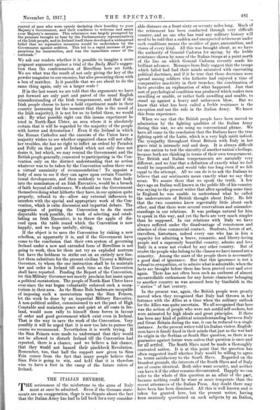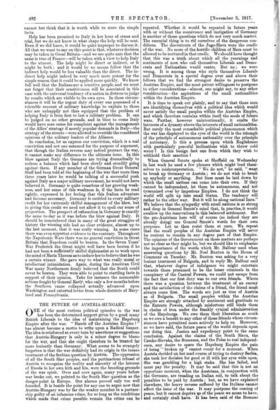THE ITALIAN REVERSE.
THE seriousness of the misfortune to the arms of Italy must at once be admitted. Even if the German state- ments are an exaggeration, the is no dispute about the fact that the Italian Army has had to fall back for a very consider- able distance on a front sixty or seventy miles long. Much of the retirement has been conducted through very difficult country, and no one who has read any military history will need to be told that a sudden and unexpected retirement under such conditions means the sacrifice of guns, ammunition, and stores of every kind. All this was brought about, as we have the authority of General Cadorna for saying, by the feeble resistance shown by some of the Italian troops at a point north of the line on which General Cadorna recently made his brilliant advance. Messages from Italy suggest that the troops which failed had had their minds saturated with enervating political doctrines, and if it be true that those doctrines were spread among soldiers who hitherto had enjoyed a time of comparative inactivity in their trenches, the combination of facts provides an explanation of what happened. Just that sort of psychological condition was produced which makes men unwilling or unable, or rather both unwilling and unable, to stand up against a heavy and unforeseen blow. But we know that what has been called a feeble resistance is the exception and not the rule in the Italian Army. We know this from experience.
When we say that the British people have been moved to admiration by the fighting qualities of the Italian Army during this war, we are using no conventional phrase. We have all come to the conclusion that the Italians have the true fighting spirit of the Latin, which is a very high spirit indeed. The sympathy throughout Great Britain with Italy in her grave trial is intensely real and deep. It is always difficult for one nation to test the sincerity of another nation's feelings, because both are thinking in terms of their own temperament. The British and Italian temperaments are naturally very different, and we fear that a definition of exactly what we feel would be impossible, and would take too long even if we felt equal to the attempt. All we can do is to ask the Italians to believe that our sentiments mean exactly what we say they mean. We assure them that we speak the truth. A few days ago an Italian well known in the public life of his country was saying to the present writer that after spending some time in England he was unable to understand what he called the undercurrents of British thought about Italy. He felt that the two countries knew regrettably little about each other, and that there were several reservations and misunder- standings. in our relations. It was perhaps natural for him to speak in this way, and yet the facts are very much simpler than he supposed. In our relations with Italy we have always suffered under the disadvantage of remoteness and absence of close commercial contact. Students, lovers of art, travellers, historians, indeed every one who has in hint a capacity for admiring a brave, romantic, and liberty-loving people and a supremely beautiful country, admire and love Italy in a sense not evoked by any other country. But of course the people who belong to the classes we have named are a minority. Among the mass of the people there is necessarily a good 'deal of ignorance. But that this ignorance is not a refusal to sympathize, or to admire what is admirable, when the facts are brought before them has been proved over and over again. There has not often been such an outburst of almost uncontrollable enthusiasm for any heroic character belonging to another country as was aroused here by Garibaldi in the " sixties " of last century.
In the present war, again, the British people were greatly moved when they recognized that Italy had thrown in her fortunes with the Allies at a time when the military outlook for the Allies was quite uncertain. We all recognized that here was the action of people who were not sordid self-seekers, but were animated by high ideals and great principles. If there has been any kind of political misunderstanding between Italy and Great Britain during the war, it can be reduced to a single instance. As the present writer told his Italian visitor, English- men have it firmly fixed in their minds that just as the war had its origin in the Serbian or South Slav question, so there is no guarantee against future wars unless that question is once and for all settled. The South Slays must be made a thoroughly contented nation. It is at this point that the question has often suggested itself whether Italy would be willing to agree to terms satisfactory to the South Slave. Regarded on the broadest grounds, the interests of the South Slays and of Italy are of course identical. Both sides want security, and neither can have it if the other remains discontented. Happily we can refer to the whole of this question as an affair of the past, because nothing could be wiser or more temperate than the recent utterances of the Italian Press. Any doubt there may have been has been dismissed. All this is well known and is taken for granted here, but the present writer, having been anxiously questioned on such subjects by an Italian,
cannot but think that it is worth while to state the simple facts.
Help has been promised to Italy in her hour of stress and trial, but we do not know in what shape the help will be sent. Even if we did know, it would be quite improper to discuss it. All that we want to say on this point is that, whatever decision may be taken in Great Britain—and we are quite sure that the same is true of France—will be taken with a view to help Italy to the utmost. The help might be direct or indirect, or it might be both ; and it would by no means follow that the indirect help would be less valuable than the direct. The in- direct help might indeed be very much more potent for the simple reason that it could be applied more quickly. We know full well that the Italians are a sensitive people, and we must not forget that their sensitiveness will be associated in this case with the universal tendency. of a nation in distress to judge by results which are visible to its own eyes. In these circum- stances it will be the urgent duty of every one possessed of a tolerable amount of military knowledge to explain to those who are unhappily not thus equipped that the problem of helpiniItaly is from first to last a military problem. It can be judged on no other grounds, and in time to come Italy would eve Bore cause for complaint against the management of the Allies' strategy if merely popular demands in Italy—the strategy of the streets—were allowed to override the considered opinions of the military leaders of the Alliance.
In conclusion, let us express our conviction, which is a real conviction and not one assumed for the purpose of argument, that though the Italian reverse may indeed protract the war, it cannot make any difference to the ultimate issue. In this blow against Italy the Germans are trying dramatically to redress a balance which had been slowly and steadily going against them. If any member of the German Great General Staff had been told at the beginning of the war that more than three years later he would be talking of a successful push against Italy as a major military movement, he would not have believed it. Germany is quite conscious of her growing weak- ness, and her sense of this weakness fs, if the facts be read rightly, expressed in her feeling that this Italian adventure had become necessary. Germany is entitled to every military credit for her extremely skilful management of the blow, but' in giving this credit we need not allow it to spoil our sense of proportion. The prospect of exhaustion in Germany is exactly the same to-day as it was before the blow against Italy. It should be remembered that in many of the great struggles of history the winning side had no clear evidence, almost up to the last moment, that it was really winning. In some cases there was even apparent evidence to the contrary. Throughout the Napoleonic Wars there was no general conviction in Great Britain that Napoleon could be beaten. In the Seven Years' War Frederick the Great might well have been beaten if he had not been a sufficiently skilful diplomatist so to work upon the mind of Maria Theresa as to induce her to believe that he was a certain winner. She gave way to what was really moral or intellectual intimidation. Again, during the American Civil War many Northerners firmly believed that the South could never be beaten. They were able to point to startling facts in support of their opinion. Take for instance the memorable actions fought by General Early, who only a few months before the Southern cause collapsed actually advanced upon Washington and extorted levies from whole districts of Mary- land and Pennsylvania.















































 Previous page
Previous page